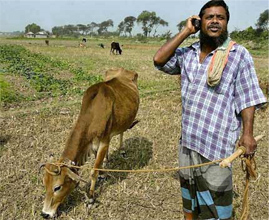Money management is a critical life skill. Those without it are often forced into a downward cycle of poverty and missed financial opportunity. Even minor setbacks can be devastating. The impoverished in developing countries are at an even greater disadvantage because of the general lack of financial education, fewer resources and challenging socio-economic conditions. Financial literacy education offers a powerful tool with the potential to help the poor escape poverty by building savings, growing assets and creating wealth.
Saving money may seem straightforward; however, many at the base of the economic pyramid (BoP) are barely able to do so. What little money they do have is kept on their person or hidden within their household. Saving  even a dollar or two per week can cultivate much needed savings habits. Core concepts such as saving money are the basic foundation for proactive financial planning. These practices will not only help consumers build savings, but also will further develop good money management habits enabling BoP consumers the rare opportunity to plan for their future.
even a dollar or two per week can cultivate much needed savings habits. Core concepts such as saving money are the basic foundation for proactive financial planning. These practices will not only help consumers build savings, but also will further develop good money management habits enabling BoP consumers the rare opportunity to plan for their future.
Still, some have raised concerns about the effectiveness of financial literacy education. Law professor Lauren E. Willis of Loyola Law School published a journal article titled “Against Financial Literacy Education” in November 2008, citing the lack of empirical support for the effectiveness of financial literacy education. In her report, she notes that the hours of study needed to obtain financial literacy is beyond the reach of most people, using as an example the complexities involved in evaluating a retirement plan. I agree: this would indeed be a cumbersome task for the non-expert. But this does not mean that ordinary consumers would not benefit with some form of basic financial literacy education.
Progress is being made toward this goal.
Organizations such as the Institute for Financial Literacy (IFL) aim to promote effective financial literacy education in the United States. Similarly, the Consumer Financial Education Body in the United Kingdom seeks to help consumers understand financial services and to help them better manage their finances. Meanwhile, the Organization for Economic Co-operation and Development and the Reserve Bank of India have co-sponsored a financial literacy workshop in Bangalore, India with a focus on the implementation of a national financial literacy program.
The beneficiaries of financial literacy education are not the only ones who stand to prosper. There are opportunities buried in untapped markets for banks and financial service providers to offer the same basic services available to those in rich countries, re-designed for BoP markets. Financial service providers serving BoP markets are rewarded with profitable sources of income by tapping into these millions of potential clients, many of whom are using innovative means to establish micro-businesses to escape the poverty trap.
The key: technology and other innovations.
 Online financial planning is a new and innovative way to provide financial planning to consumers who typically do not have access to professional advice. According to the Wall Street Journal, it is estimated that nearly 50 million U.S.-based consumers who could potentially benefit from professional financial advice lack access to these services. Imagine the need for these services, even in their most basic form, in developing nations. Technology-based solutions—such as cell phone banking—have the potential to make a connection with the rural poor. Banks do not find it profitable to establish branches in regions where the remote poor live. Cell phone bank accounts facilitate ease of deposits, thus avoiding long journeys to deliver cash, the need to conceal money within one’s household or to incur expensive wire transfer charges.
Online financial planning is a new and innovative way to provide financial planning to consumers who typically do not have access to professional advice. According to the Wall Street Journal, it is estimated that nearly 50 million U.S.-based consumers who could potentially benefit from professional financial advice lack access to these services. Imagine the need for these services, even in their most basic form, in developing nations. Technology-based solutions—such as cell phone banking—have the potential to make a connection with the rural poor. Banks do not find it profitable to establish branches in regions where the remote poor live. Cell phone bank accounts facilitate ease of deposits, thus avoiding long journeys to deliver cash, the need to conceal money within one’s household or to incur expensive wire transfer charges.
Another possible innovation may lie in the creation of social investment strategies designed specifically for consumers typically denied access to financial markets, giving them the opportunity to grow wealth in capital markets. Friends, family and neighbors in BoP communities often pool their resources. Fund managers and investment advisors may consider the possible rewards in providing these consumers the opportunity to invest pooled funds, with continued contributions even in the smallest of increments, into low-fee micro-investing index funds.
Multiple ways to get involved exist.
What can you do if you are interested in making a difference? The IFL offers opportunities as volunteer educators or outreach volunteers. Volunteer educators provide financial literacy education in their local communities. Outreach volunteers develop community based networks, hold financial literacy discussions and write letters to newspapers or journals in support of financial literacy education. The Center for Financial Certifications, an independent division of the IFL, offers professional certifications in credit counseling, financial education and debt management, among others.
Universities are an ideal source of both initiative funding and financial expertise. Like-minded social entrepreneurs can form student and professional organizations enabling students, alumni, and academics to work collectively toward providing financial literacy education to the local community. These initiatives can be a terrific source of uniting low-income families with financial services providers who may better understand and meet their actual needs. When these consumers become financially literate, they are more likely to better manage their money, and thus avoid predatory bank revenue-generating schemes.
Many at the top of the economic pyramid have the willingness to explore new and innovative ways to promote financial literacy education. At the same time, many at the bottom are actively involved in fighting their way out of poverty. Collectively we have the potential to grant the poor access to the basic building blocks of financial independence.
Terry Tasker (PMBA ’09, BBA ’07) co-founded the microfinance initiative at Florida International University (FIU). This article originally appeared in the Social Innovation blog.




